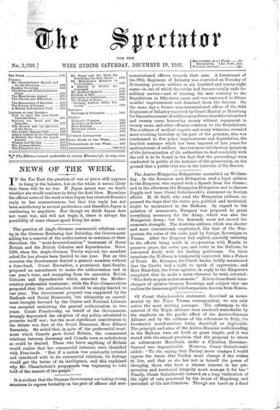The Austro-Hungarian Delegations assembled on Weaves. day. -.In the forenoon
each Delegation read a loyal address to the-Emperor, who replied with a Speech from the throne ; and in the afternoon the Hungarian Delegation met to discuss Supply and hear Count Goluchowski's statement on foreign affairs. M. de Szell, who read the Hungarian address, ex- pressed the hope that the status quo, political and territorial; might. be maintained in the Balkans. In regard to 'Ufa question of armaments, Hungary was prepared to grant everything necessary for the Army, which was also the Hungarian Army; but the demands must not exceed her economic strength. The Austrian address, which was shorter and more conventional, emphasised, like that of the Hun- garians, the value of the visits paid by foreign Sovereigns to Vienna. After the Emperor had replied, specially referring to the efforts being made in co-operation with Russia to preserve peace, the status quo, and order in the Balkans, he conversed freely with the leading politicians. On these occasions the Hofburg is temporarily converted into a Palace of Truth. Dr. Kramarz, the Czech leader, boldly maintained that the Czechs had a right to speak of oppression ; and Herr Bianchini, the Croat agitator, in reply to the Einieror's complaint that he made a noise wherever . he went, retorted : " Who feels no pain makes no noise." It is in these frank inter- changes of opinion between Sovereign and subject that one realises the immense gulf which separates Austria from Russia.


















































